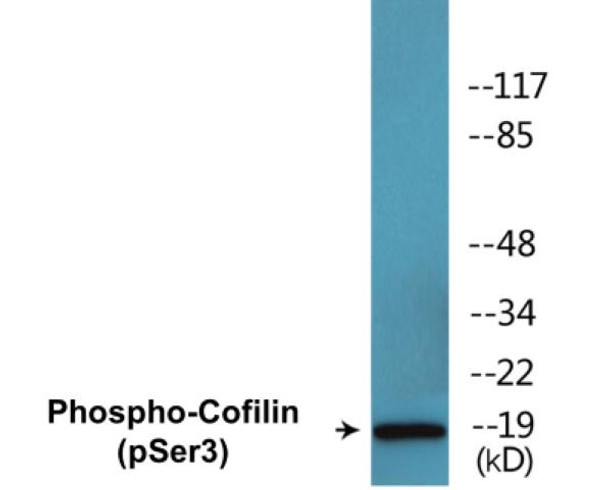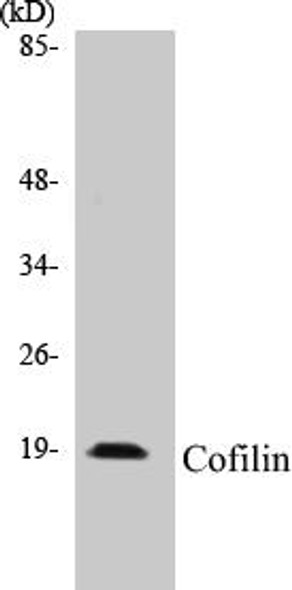Cofilin (Phospho-Ser3) Fluorometric Cell-Based ELISA Kit
- SKU:
- FBCAB00062
- Product Type:
- ELISA Kit
- ELISA Type:
- Cell Based Phospho Specific
- Reactivity:
- Human
- Mouse
- Rat
- Detection Method:
- Fluorometric
Description
Cofilin (Phospho-Ser3) Cell-Based ELISA Kit
The Cofilin (Phospho-Ser3) Cell-Based ELISA Kit is a convenient, lysate- free, high throughput and sensitive assay kit that can monitor Cofilin phosphorylation and expression profile in cells. The kit can be used for measuring the relative amounts of phosphorylated Cofilin in cultured cells as well as screening for the effects that various treatments, inhibitors (ie. siRNA or chemicals), or activators have on Cofilin phosphorylation.
How does our Cofilin (Phospho-Ser3) Fluorometric Cell-Based ELISA Kit work?
Qualitative determination of Cofilin (Phospho-Ser3) concentration is achieved by an indirect ELISA format. In essence, Cofilin (Phospho-Ser3) is captured by Cofilin (Phospho-Ser3)-specific primary (1°) antibodies while Dye 1-conjugated and Dye 2-conjugated secondary (2°) antibodies bind the Fc region of the 1° antibody. Through this binding, the dye conjugated to the 2° antibody can emit light at a certain wavelength given proper excitation, hence allowing for a fluorometric detection method. Due to the qualitative nature of the Cell-Based ELISA, multiple normalization methods are needed:
| 1. | A monoclonal antibody specific for human GAPDH is included to serve as an internal positive control in normalizing the target RFU values. |
| 2. | An antibody against the nonphosphorylated counterpart of Cofilin (Phospho-Ser3) is also provided for normalization purposes. The RFU values obtained for non-phosphorylated Cofilin can be used to normalize the RFU value for phosphorylated Cofilin. |
Cofilin (Phospho-Ser3) Fluorometric Cell-Based ELISA Kit -Information
| Product Name: | Cofilin (Phospho-Ser3) Fluorometric Cell-Based ELISA Kit |
| Product Code/SKU: | FBCAB00062 |
| Description: | The Cofilin (Phospho-Ser3) Fluorometric Cell-Based Phospho ELISA Kit is a convenient, lysate-free, high throughput and sensitive assay kit that can monitor Cofilin (Phospho-Ser3) protein phosphorylation and expression profile in cells. The kit can be used for measuring the relative amounts of phosphorylated Cofilin (Phospho-Ser3) in cultured cells as well as screening for the effects that various treatments, inhibitors (ie. siRNA or chemicals, or activators have on CFL1 phosphorylation. |
| Dynamic Range: | > 5000 Cells |
| Detection Method: | Fluorometric |
| Storage/Stability: | 4°C/6 Months |
| Reactivity: | Human, Mouse, Rat |
| Assay Type: | Cell-Based ELISA |
| Database Links: | Gene ID: 3716, UniProt ID: P23528, OMIM #: 147795, Unigene #: Hs.207538 |
| Format: | Two 96-Well Plates |
| NCBI Gene Symbol: | CFL1 |
| Sub Type: | Phospho |
| Target Name: | Phospho-Cofilin (Ser3) |
Kit Principle
Figure: Schematic representation of Assay Genie Cell-Based Fluorometric ELISA principle
Kit components | Quantity |
| 96-Well Black Cell CultureClear-Bottom Microplate | 2 plates |
| 10X TBS | 24 ml |
| Quenching Buffer | 24 ml |
| Blocking Buffer | 50 ml |
| 15X Wash Buffer | 50 ml |
| Primary Antibody Diluent | 12 ml |
| 100x Anti-Phospho Target Antibody | 60 µl |
| 100x Anti-Target Antibody | 60 µl |
| Anti-GAPDH Antibody | 110 µl |
| Dye-1 Conjugated Anti-Rabbit IgG Antibody | 6 ml |
| Dye-2 Conjugated Anti-Mouse IgG Antibody | 6 ml |
| Adhesive Plate Seals | 2 seals |
Additional equipment and materials required
The following materials and/or equipment are NOT provided in this kit but are necessary to successfully conduct the experiment:
- Fluorescent plate reader with two channels at Ex/Em: 651/667 and 495/521
- Micropipettes capable of measuring volumes from 1 µl to 1 ml
- Deionized or sterile water (ddH2O)
- 37% formaldehyde (Sigma Cat# F-8775) or formaldehyde from other sources
- Squirt bottle, manifold dispenser, multichannel pipette reservoir or automated microplate washer
- Graph paper or computer software capable of generating or displaying logarithmic functions
- Absorbent papers or vacuum aspirator
- Test tubes or microfuge tubes capable of storing ≥1 ml
- Poly-L-Lysine (Sigma Cat# P4832 for suspension cells)
- Orbital shaker (optional)
Kit Protocol
This is a summarized version of the kit protocol. Please view the technical manual of this kit for information on sample preparation, reagent preparation and plate lay out.
| 1. | Seed 200 µl of desired cell concentration in culture medium into each well of the 96-well plates. For suspension cells and loosely attached cells, coat the plates with 100 µl of 10 µg/ml Poly-L-Lysine (not included) to each well of a 96-well plate for 30 minutes at 37°C prior to adding cells. |
| 2. | Incubate the cells for overnight at 37°C, 5% CO2. |
| 3. | Treat the cells as desired. |
| 4. | Remove the cell culture medium and rinse with 200 µl of 1x TBS, twice. |
| 5. | Fix the cells by incubating with 100 µl of Fixing Solution for 20 minutes at room temperature. The 4% formaldehyde is used for adherent cells and 8% formaldehyde is used for suspension cells and loosely attached cells. |
| 6. | Remove the Fixing Solution and wash the plate 3 times with 200 µl 1x Wash Buffer for 3 minutes. The plate can be stored at 4°C for a week. |
| 7. | Add 100 µl of Quenching Buffer and incubate for 20 minutes at room temperature. |
| 8. | Wash the plate 3 times with 1x Wash Buffer for 3 minutes each time. |
| 9. | Dispense 200 µl of Blocking Buffer and incubate for 1 hour at room temperature. |
| 10. | Wash 3 times with 200 µl of 1x Wash Buffer for 3 minutes each time. |
| 11. | Add 50 µl of Primary Antibody Mixture P to corresponding wells for Cofilin (Phospho-Ser3) detection. Add 50 µl of Primary Antibody Mixture NP to the corresponding wells for total Cofilin detection. Cover the plate with parafilm and incubate for 16 hours (overnight) at 4°C. If the target expression is known to be high, incubate for 2 hours at room temperature. |
| 12. | Wash 3 times with 200 µl of 1x Wash Buffer for 3 minutes each time. |
| 13. | Add 50 ul of Secondary Antibody Mixture to corresponding wells and incubate for 1.5 hours at room temperature in the dark. |
| 14. | Wash 3 times with 200 µl of 1x Wash Buffer for 3 minutes each time. |
| 15. | Read the plate(s) at Ex/Em: 651/667 (Dye 1) and 495/521 (Dye 2). Shield plates from direct light exposure. |
| 16. | Wash 3 times with 200 µl of 1x Wash Buffer for 5 minutes each time. |
Cofilin (Phospho-Ser3) - Protein Information
| UniProt Protein Function: | Cofilin-1: a cytoskeletal protein that controls actin depolymerization. Has a 5-10-fold higher affinity for ATP-actin monomers than cofilin-1. May promote filament assembly rather than disassembly. Two alternatively spliced variants are described. Isoform b is expressed predominantly in skeletal muscle and heart, while isoform a is expressed in various tissues. |
| UniProt Protein Details: | Protein type:Motility/polarity/chemotaxis; Nuclear receptor co-regulator; Cytoskeletal Chromosomal Location of Human Ortholog: 11q13 Cellular Component: cortical actin cytoskeleton; cytoplasm; extracellular space; focal adhesion; intercellular junction; membrane; nuclear matrix; nucleus; vesicle Molecular Function:actin binding; protein binding Biological Process: actin cytoskeleton organization and biogenesis; actin filament depolymerization; axon guidance; blood coagulation; cytokinesis after mitosis; cytoskeleton organization and biogenesis; ephrin receptor signaling pathway; establishment of cell polarity; innate immune response; negative regulation of apoptosis; neural crest cell migration; neural fold formation; platelet activation; platelet degranulation; positive regulation of actin filament depolymerization; protein amino acid phosphorylation; regulation of cell morphogenesis; response to amino acid stimulus; response to virus; Rho protein signal transduction |
| NCBI Summary: | The protein encoded by this gene can polymerize and depolymerize F-actin and G-actin in a pH-dependent manner. Increased phosphorylation of this protein by LIM kinase aids in Rho-induced reorganization of the actin cytoskeleton. Cofilin is a widely distributed intracellular actin-modulating protein that binds and depolymerizes filamentous F-actin and inhibits the polymerization of monomeric G-actin in a pH-dependent manner. It is involved in the translocation of actin-cofilin complex from cytoplasm to nucleus.[supplied by OMIM, Apr 2004] |
| UniProt Code: | P23528 |
| NCBI GenInfo Identifier: | 116848 |
| NCBI Gene ID: | 1072 |
| NCBI Accession: | P23528.3 |
| UniProt Secondary Accession: | P23528,Q53Y87, Q9UCA2, B3KUQ1, |
| UniProt Related Accession: | P23528 |
| Molecular Weight: | 18,502 Da |
| NCBI Full Name: | Cofilin-1 |
| NCBI Synonym Full Names: | cofilin 1 |
| NCBI Official Symbol: | CFL1 |
| NCBI Official Synonym Symbols: | CFL; cofilin; HEL-S-15 |
| NCBI Protein Information: | cofilin-1 |
| UniProt Protein Name: | Cofilin-1 |
| UniProt Synonym Protein Names: | 18 kDa phosphoprotein; p18; Cofilin, non-muscle isoform |
| Protein Family: | Cofilin |
| UniProt Gene Name: | CFL1 |
| UniProt Entry Name: | COF1_HUMAN |







